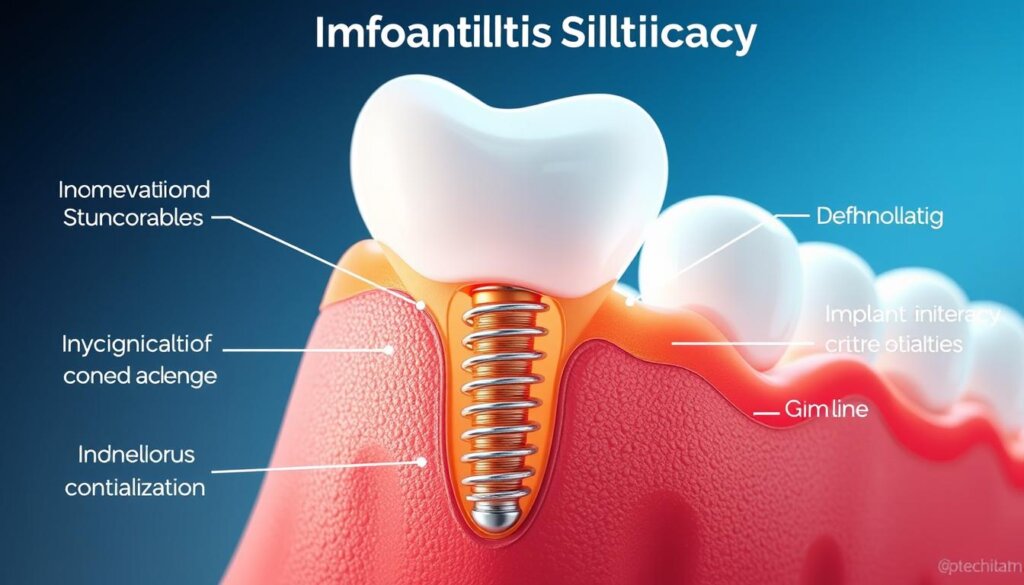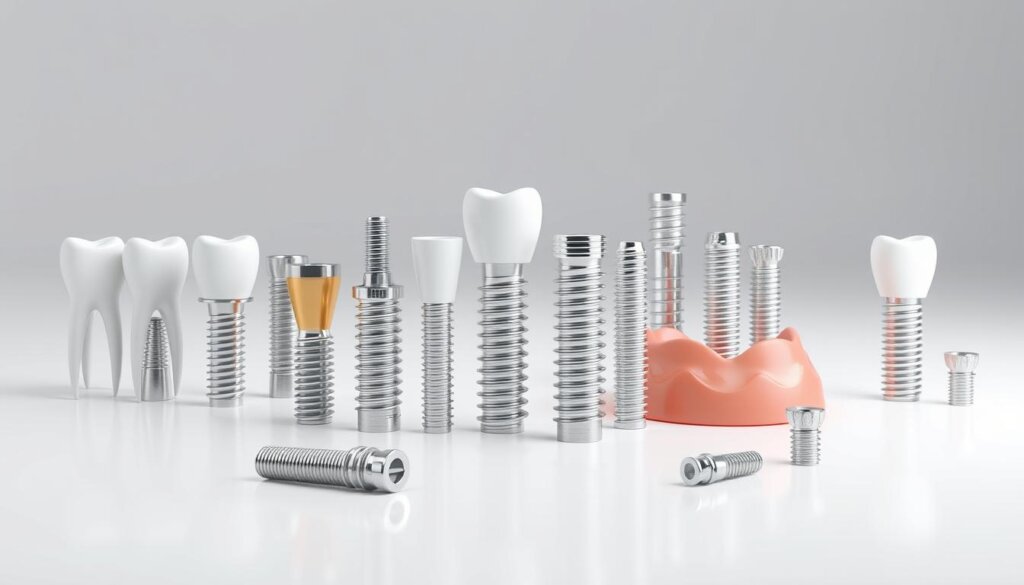Am I a Good Candidate for a Dental Implant?
Over 120 million Americans live with at least one missing tooth. This creates a big demand for ways to fix it. Many of these people think about dental implants as a lasting solution. But, they often wonder, “Am I a good candidate for a dental implant?” This question shows how advanced dental methods meet individual patient care needs.
Getting checked for a dental implant involves more than looking at the missing tooth space. It connects patients with specialists who look beyond just the mouth. It’s a process that explores many questions. These include the strength of the jawbone and overall health that might affect the surgery. The conversation starts by looking at one’s smile but quickly goes deeper. It considers lifestyle, medical history, and readiness for the implant process.
Figuring out if you’re right for a dental implant can seem tough, but it’s an important talk. It keeps the patient safe from any problems and makes sure the dental health investment is likely to do well. During the evaluation, it’s key to look at all health aspects. And, it’s important to talk about any worries early on.
Key Takeaways
- A deep dental implant check is needed to see if someone is a good fit.
- Based on missing at least one tooth, over 120 million Americans might need dental implants.
- Dental implant meetings look into more than the missing tooth, like bone density and general health.
- Not treating gum disease or having unmanaged diabetes can affect if you can get dental implants.
- The success of a dental implant is closely tied to keeping great oral hygiene.
Understanding Dental Implants
When looking for ways to replace missing teeth, it’s important to know about dental implants. Dental implants are a strong choice for filling gaps because they join with the bone, giving a sound base for artificial teeth.
What Are Dental Implants?
Dental implants are titanium posts put into the jawbone under the gums. This setup lets the implant act like the root of a lost tooth. A crown that looks like a real tooth goes on top. Dental implants are unique because they offer a lasting place for replacement teeth. They are stable and feel natural.
How Do Dental Implants Work?
Dental implants work well because they bond with the jawbone, a process called osseointegration. This bond not only keeps the implant secure but also stops bone loss that can happen with tooth loss. This is why having good oral health is key for those considering implants.
Benefits of Choosing Dental Implants
There are many good reasons to choose dental implants if you’re missing teeth. They offer benefits like:
- Keeping the jawbone healthy, which prevents more bone loss and keeps a natural jawline.
- Making eating easier and more comfortable, since they work like real teeth.
- Boosting self-confidence and looks, as they give a natural-looking smile that can last with good care.
- They don’t change the teeth next to them, saving more of your natural teeth.
For those thinking about getting dental implants, understanding these points is key. Dental implants are not just durable and good-looking. They also help a lot in keeping your mouth healthy.
Factors Influencing Candidacy
People often wonder if they’re good candidates for dental implants. They must go through a detailed check-up. This check considers age, bone density, and overall health. Checking these ensures patients meet the dental implant criteria for a successful surgery.
Age as a Consideration
Age is key when thinking about dental implants. Candidates need a fully grown jawbone, usually present by late teens. This is to make sure the implant is stable. So, young patients might have to wait for their jawbone to grow.
Importance of Bone Density
Bone density is another important point. An dental implant assessment makes sure a patient’s bone density can hold the implant. If bone mass is too low, bone grafting might be needed before getting an implant.
Overall Health Requirements
Good health is also very important for getting a dental implant. Healing and accepting the implant are crucial. This means people with unmanaged diseases like diabetes might have higher risks and complications.
Getting to know these conditions will help those looking into dental implants understand if they can proceed. Talking to a specialist about these points helps make good, informed decisions about dental health.
Common Dental Issues Addressed
Dental implants have changed how we solve dental problems. They improve the look of a smile and its function. The chance to get implants depends on the dental issues one has. These can be missing teeth, major tooth damage, or gum disease.
Missing Teeth and Their Impact
Missing teeth do more than just affect your smile. They can make other teeth move, cause misalignment, and make cleaning your teeth hard. This can make dental health get worse. Implants offer a steady replacement. They keep teeth in line and share biting pressure evenly.
Severely Damaged Teeth
Damaged teeth can’t always be saved. This can happen because of an injury or decay. Losing a tooth can make your mouth less strong. An implant can replace a lost tooth. It helps you chew normally and keeps the rest of your teeth and jaw healthy. Checking if the area around the implant is healthy is very important.
Periodontal Disease Considerations
Gum disease hurts the gums and bones that hold teeth in place. It can affect how well an implant works. Before getting an implant, any gum disease needs to be treated. This makes sure the gum is ready for the implant. There’s a detailed check-up and treatment to lower the risk that the implant won’t work.
It’s key to understand how these dental problems can affect getting an implant. Planning treatment includes fixing and managing these issues. This leads to successful implants. Then, they restore the way your mouth works and your confidence in your smile.
The Consultation Process
The first step is the dental implant consultation. It’s key to making sure patients get a plan that fits their needs.
During the dental implant evaluation, experts carefully check the mouth. They look at key parts:
Initial Screening Procedures
The initial screening looks closely at teeth and gums. It checks oral health and spots any issues that could affect implant success.
Necessary Dental Imaging
X-rays and sometimes CT scans are very important. These dental evaluations measure bone strength, find nerves, and help place the implant correctly.
Discussion of Medical History
Knowing medical history, including medications and any conditions like diabetes, is vital. It helps avoid problems and ensures the implant works well.
Every part of the dental implant consultation gives important info. This helps create the best dental care plan, making sure implants last and work well for each patient.
Health Conditions Impacting Eligibility
When planning for dental implants, it’s vital to look at health issues that may affect success. Knowing about these conditions helps make the process smoother. This ensures patients get care that’s best for them, making good results more likely.
Diabetes Management
People with uncontrolled diabetes may find getting dental implants harder. High blood sugar can hurt healing after surgery. So, managing diabetes well is key. Also, working closely with doctors helps improve chances for implant success.
Heart Health Considerations
Heart health plays a big role in getting dental implants. Certain heart problems and medicines could change how well dental implants work. It’s crucial for patients to share all their heart health info before getting implants.
Tobacco Use and Impact on Healing
Using tobacco can slow down healing after getting dental implants. Smoking makes it hard for blood and oxygen to get around, which are must-haves for healing. Stopping smoking not only boosts overall health but also helps dental implants last longer and work better.
If you’re thinking about dental implants, it’s important to consider these health issues. Talking about these things with your dentist helps make a plan that fits your health needs. This way, you can boost your chances of having successful dental implants.
Oral Hygiene and Maintenance
Keeping your mouth clean is not only good but crucial for your dental implant’s life. If you’re asking “Am I a good candidate for a dental implant?” you need to be ready to follow a strict oral care routine after the procedure. This dedication is key in determining if a dental implant will work for you, as the health of the area around the implant impacts its success.
To have a successful dental implant, practicing great oral hygiene is vital. You should brush twice a day, floss, and use an antibacterial mouthwash. These steps are important to avoid diseases like peri-implantitis, which can cause the implant to fail.
Regular Dental Check-Ups
It’s very important to see your dentist regularly after getting an implant. These visits let the dentist check how well the implant is bonding with the bone and the health of your gums. Catching problems early can keep your implant in top shape, highlighting how crucial regular check-ups are.
Cleaning and Care for Implants
Looking after your dental implant isn’t much different from caring for your natural teeth, but it does require more attention to preventing plaque buildup around the implant. Dental professionals will give you instructions suited to your needs. This might include using special brushes to clean around the implant properly.
Lifestyle Factors to Consider
When thinking about getting dental implants, your lifestyle plays a big part in how well they work. Things like what you eat, how active you are, and how you handle stress are crucial. Each of these elements is vital during the evaluation for dental implants.
Eating right is key for your mouth and body’s health. A diet full of vitamins and minerals helps keep your bones strong, which is super important for dental implant success. Calcium and vitamin D, for example, keep your jawbone sturdy and help healing after you get implants. Also, too much sugar and smoking can harm dental implants, so it’s good to cut back before getting them.
Physical activity is not only good for your overall health but also helps your dental implants settle in better. Exercise increases blood flow, aiding in quicker healing. It also helps you maintain a healthy weight, which lowers stress on your jaw and tissues around it.
Keeping stress low is key for your body to heal well. If you’re too stressed, your immune system could weaken, making it harder to recover from dental implant surgery. That’s why managing stress is a key step when looking into dental implants.
So, if you’re thinking about dental implants, looking at your lifestyle is a must. Here’s a quick look at how lifestyle affects dental implants:
| Lifestyle Factor | Recommended Practices | Potential Impact on Dental Implants |
|---|---|---|
| Dietary Habits | Rich in calcium and vitamins, low in sugar | Improves bone density and reduces infection risks |
| Physical Activity | Moderate exercise, several times a week | Enhances blood circulation and healing |
| Stress Management | Regular relaxation and mindfulness practices | Supports immune function and healing processes |
Thinking about these lifestyle factors can better your chances with dental implants. This is how you can make sure they work well for you.
Emotional Readiness for Implants
Choosing to get dental implants is more than just a health decision. It requires a deep dental implant consultation. This looks into how ready you are emotionally. The psychological side of this decision is very important for both the process and the results.
Being mentally healthy is key. Conditions like anxiety or depression can affect how you heal. That’s why a full dental implant assessment must include a look at your mental health.
Mental Health Considerations
People with ongoing mental health struggles may find healing harder. Talking about these issues during the dental implant consultation helps prepare patients properly.
Expectations vs. Reality
Sometimes, people have ideas about dental implants that aren’t realistic. It’s crucial to talk things through so patients understand what’s actually possible. This helps figure out if Am I a good candidate for a dental implant?
Support Systems and Resources
Having support from family or support groups is vital for recovery. Access to help through counseling or educational programs is also key for a smooth recovery.
Dental Implant Types and Options
Looking into dental implant types is key for those thinking about tooth replacement options. We’ll cover the features and best uses of each implant type. This will help anyone looking to replace missing teeth make an informed choice.
Endosteal implants are often picked because they work well and are trusted. They need a strong jawbone for the implant to be screwed into. This creates a solid base for the fake teeth. This option is great for those with strong bone density and healthy mouths.
Subperiosteal implants suit people with not enough jawbone density. These aren’t put inside the bone but below the gum, on the bone. They have a metal frame that gets attached to the jawbone as the gum heals.
Then there are Zygomatic implants. Instead of the jawbone, they go into the cheekbone. This choice is for people with a lot of jawbone loss who can’t have bone augmentation to get traditional implants.
| Type of Implant | Description | Indications |
|---|---|---|
| Endosteal | Screws placed directly into the jawbone | Patients with adequate jawbone density needing stability for crowns or bridges |
| Subperiosteal | Metal frame fitted onto the jawbone under the gum tissue | Patients with inadequate jawbone density who do not opt for bone grafting |
| Zygomatic | Implant anchored into the cheekbone | Patients with severe jawbone degradation seeking alternative implant sites |
Financing Dental Implants
Getting dental implants can seem easier and less scary with the right financing options and insurance knowledge. You can look into private insurance, dental clinic payment plans, or compare other dental solution costs. This helps manage the finances of getting dental implants better.
When looking into financing dental implants, a dental implant consultation is a good start. Here, you can talk about dental implant options and how to pay for them over time. It’s important to carefully look at each financing option to find the best one without giving up quality dental care.
Ensuring patients can afford their dental implants is as important as the surgical expertise provided. Good financing options are key to helping patients make well-informed, confident choices about their oral health investments.
It’s important to know which insurance plans cover dental implants, or part of the cost, along with any payment plans. This knowledge affects how you plan financially for this dental health investment. So, talking about these details at the first consultation is encouraged.
| Financial Option | Description | Benefits |
|---|---|---|
| Insurance Coverage | Covers partial or full cost depending on the plan | Reduces out-of-pocket expenses |
| Payment Plans | Split the cost into monthly payments | Makes costs more manageable over time |
| Comparison: Implants vs. Dentures | Outlines long-term cost-effectiveness | Highlights durability and fewer replacements |
Though dental implants might cost more at first than other dental options, their long-lasting nature and the way they improve quality of life mean saving money in the long run. This is a key factor in financial decisions about dental implants.
The Implant Procedure
Getting a dental implant procedure is a big step in making your teeth healthy and look good. This process is known for being very successful thanks to modern medical technology. It involves detailed surgical steps that need careful planning and getting the patient ready.
The surgery for a dental implant is done with local anesthesia to make sure the patient is comfortable. The doctor puts the implant post into the jawbone. This creates a strong base for the new tooth. It’s important for the implant to work right and look real.
After getting a dental implant, the recovery process is key to the surgery’s success. Patients get instructions on how to take care of themselves. This includes what to eat, what activities to avoid, and how to clean their teeth. Following these steps helps the implant heal and work well.
Knowing the steps of the dental implant surgery and how to recover is crucial. It helps patients know what to expect. It also helps them do their part in making the surgery work.
Potential Risks and Complications
Dental implants are a top choice for many wanting better dental health. But it’s key to know the dental implant risks and dental implant complications. Though problems are rare, being aware helps you make smarter choices.
First, all surgeries, including dental implants, could lead to infections and healing challenges. Carefully following your dentist’s advice after surgery can lower these risks. Also, even if it’s rare, implants sometimes fail. Choosing a skilled dentist and making sure your bones are strong and healthy is crucial.
Then, some may react badly to the materials in dental implants, like titanium. Though it doesn’t happen often, it’s still important. Always tell your healthcare provider about any allergies you have to avoid these issues.
| Complication | Possible Cause | Prevention Strategy |
|---|---|---|
| Infection | Improper post-surgery care | Rigorous hygiene and follow-up appointments |
| Implant Failure | Inadequate bone support | Pre-surgical assessments and treatments |
| Allergic Reaction | Sensitivity to implant material | Prior allergen testing and material review |
In summary, knowing about dental implant risks is crucial. It helps make your implant procedure more successful and your recovery smoother and more comfortable.
Long-Term Care for Dental Implants
Getting a dental implant is just the start. After that, a detailed plan for dental implant maintenance is needed. This ensures your new smile lasts long and works well. It includes daily cleaning and watching for warning signs.
After getting dental implants, you must keep your mouth healthy. This means regular brushing and flossing with the right products. Also, seeing your dentist regularly to check on the implants is key.
- Regular Dental Check-ups: Going to the dentist often helps clean spots hard to reach at home. This keeps your implants and gums healthy.
- Proper Cleaning Techniques: Using soft brushes and gentle toothpaste helps avoid damage. This ensures your mouth stays clean.
- Avoiding Harmful Habits: Stay away from smoking and eating hard foods. These can harm your implant. It’s best to avoid them to keep your implant safe.
It’s important to watch out for problems like pain, swelling, or a bad taste. If you notice these, see your dentist right away. Quick action can stop big issues that might hurt your implant.
The final part of dental implant maintenance is being smart with your lifestyle. Use proper protective gear for sports and be careful with what you eat. Try to avoid very hard or sticky foods.
The key to implant success is working with your dental team. Taking good care of your dental implants not only keeps you healthy. It also makes sure they work well for many years.
Alternatives to Dental Implants
Dental implants are a top choice for replacing teeth, yet they’re not alone. People have many tooth replacement options that meet varied needs, tastes, and budgets. Learning about other choices allows for a choice that fits one’s dental health and way of living.
Dentures are a traditional choice that many have used for years. But it’s key to look at the good and bad before choosing. Bridges are another choice, but they might need changing nearby healthy teeth. If you want something less intense, consider adhesive bridges or removable partials.
Talking with a dentist is a must to find the best option. They can look at your dental health and talk about what you prefer, guiding you to a personalized plan. This plan might include dental implant alternatives that make you feel good without surgery.
It’s vital to check all tooth replacement options well and think about how they’ll affect your dental health over time. Some choices may be easier and cost less now but might not last as long or work as well as implants. Making an informed choice is key to having the best dental health.
Making the Final Decision
Deciding to get dental implants is important and needs careful thought. Asking, “Am I right for a dental implant?” needs a detailed answer. A dental implant consultation is the first step. It lets you fully discuss if you’re a good fit with an expert.
Consulting with Your Dentist
Your dentist’s knowledge is key at this time. They’ll look at many things, like your oral health and bone strength. They’ll see if you’re a match for the implant and talk about keeping the implant healthy.
Reflecting on Your Personal Situation
Thinking about your own situation is also key. Your general health, how well you keep up with oral care, and your budget matter a lot. Knowing yourself well helps match your hopes to what getting an implant involves.
Commitment to Long-Term Care
In the end, getting implants is a joint effort. It means being ready for taking care of them for a long time. A thorough chat with your dentist and knowing if you’re really ready help you decide wisely for your health.







